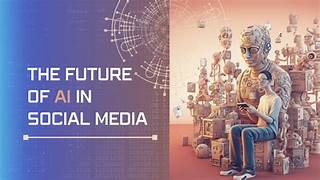The Impact of AI on Social Media and Online Platforms
Artificial intelligence (AI) has become an integral part of the digital ecosystem, profoundly influencing how social media and online platforms operate. From content recommendation algorithms to advanced moderation tools, AI plays a pivotal role in shaping user experiences, driving engagement, and addressing challenges within these platforms. While AI offers immense benefits, it also raises critical concerns about privacy, ethics, and societal impact. This article explores the transformative role of AI in social media and online platforms, its advantages, challenges, and the future it promises.
AI’s Role in Shaping Social Media and Online Platforms
AI has become the backbone of many social media platforms, enabling functionalities that range from user personalization to predictive analytics. Here are some key areas where AI exerts its influence:
- Personalized Content Recommendations
AI algorithms analyze user behavior, preferences, and interactions to provide personalized content. Platforms like YouTube, Netflix, and Instagram use machine learning models to recommend videos, posts, and products that align with users’ interests, significantly boosting user engagement.
- Advanced Advertising
Targeted advertising is one of the most lucrative applications of AI on social media. By leveraging user data, AI helps brands identify potential customers, predict buying behavior, and deliver ads that resonate with individual preferences. This precision maximizes ROI for advertisers and ensures relevant content for users.
- Content Moderation
AI-powered moderation tools are used to detect and remove inappropriate, harmful, or spam content. Machine learning models and natural language processing (NLP) systems scan text, images, and videos to identify violations of platform policies, ensuring a safer online environment.
- Enhanced User Engagement
AI-driven tools like chatbots and virtual assistants improve user interaction on social platforms. These technologies provide real-time responses, address queries, and even facilitate transactions, enhancing the overall user experience.
- Trend and Sentiment Analysis
Social media platforms utilize AI to analyze trends and gauge public sentiment. These insights are valuable for businesses, policymakers, and content creators, enabling them to tailor strategies and content to the prevailing mood of their target audiences.
Benefits of AI in Social Media
- Improved User Experience
AI enhances user experience by personalizing content, curating news feeds, and making platforms intuitive and easy to navigate. It allows users to discover relevant content effortlessly.
- Scalability
AI enables platforms to manage vast amounts of data and user interactions. Automated processes ensure that platforms remain functional and responsive, even with millions of simultaneous users.
- Efficient Content Management
AI tools streamline content creation and curation. For instance, platforms use AI to suggest hashtags, edit images, and even generate posts, saving time and effort for users and brands.
- Safety and Security
AI-powered systems enhance cybersecurity by detecting fake accounts, phishing attempts, and malicious activities. This fosters trust and credibility on social media platforms.
Challenges of AI in Social Media
While AI has revolutionized social media, it is not without its drawbacks. Several challenges need to be addressed to ensure ethical and responsible AI use:
- Privacy Concerns
AI relies heavily on user data to function effectively. This dependency raises significant concerns about data privacy and surveillance. Misuse of data or breaches can lead to loss of trust and legal repercussions.
- Algorithmic Bias
AI systems can perpetuate biases present in their training data, leading to unfair treatment or discrimination. For example, biased algorithms may favor certain demographics, exclude minority voices, or amplify harmful content.
- Echo Chambers and Misinformation
AI’s focus on personalization can inadvertently create echo chambers, where users are exposed only to content that reinforces their existing beliefs. Additionally, AI algorithms may prioritize sensational or misleading content to drive engagement, contributing to the spread of misinformation.
- Ethical Dilemmas
The deployment of AI raises ethical questions about accountability and transparency. Who is responsible when AI makes mistakes or causes harm? The lack of clear governance frameworks exacerbates these concerns.
- Job Displacement
As AI automates tasks like content moderation and customer service, it may lead to job losses in these sectors. The challenge lies in balancing automation with human employment.
Case Studies: AI in Action
- Facebook’s Content Moderation
Facebook employs AI to identify and remove hate speech, misinformation, and graphic content. Its algorithms analyze billions of posts daily, flagging harmful content for review by human moderators. However, the platform has faced criticism for its inability to fully address bias and misinformation.
- TikTok’s Recommendation System
TikTok’s success largely stems from its AI-powered recommendation engine. By analyzing user interactions, the platform delivers highly engaging and addictive content tailored to individual preferences. While this has boosted user growth, it has also raised concerns about addiction and over-personalization.
- Twitter’s Sentiment Analysis
Twitter uses AI to analyze trends and public sentiment during major events. This capability has been instrumental for brands and governments in understanding public opinion and responding to crises effectively.
The Future of AI in Social Media
The role of AI in social media will only grow as technologies advance. Here are some trends and possibilities for the future:
- Hyper-Personalization
Future AI systems will offer even more precise personalization, taking into account nuanced preferences, contextual factors, and real-time data. This will create highly engaging and immersive experiences.
- Virtual Reality (VR) and Augmented Reality (AR) Integration
AI will play a crucial role in integrating VR and AR into social media platforms. From virtual meetups to interactive content, these technologies will redefine how users interact online.
- Advanced Content Moderation
AI will evolve to address current limitations in content moderation, reducing bias and improving accuracy. Hybrid models combining AI and human oversight will likely become the standard.
- Ethical AI Development
As awareness of AI’s societal impact grows, platforms will prioritize ethical AI practices, including transparency, accountability, and inclusivity.
- Regulatory Frameworks
Governments and international bodies will likely establish stricter regulations to govern AI’s use in social media. This will ensure that AI serves the public good while mitigating risks.
Conclusion
AI has fundamentally transformed social media and online platforms, enhancing user experiences, driving innovation, and addressing operational challenges. However, its widespread use also raises critical questions about privacy, ethics, and societal impact. To fully harness the potential of AI while mitigating its risks, stakeholders—including tech companies, governments, and users—must collaborate to develop responsible AI practices. As we move forward, the challenge lies not only in advancing AI technologies but also in ensuring they are used to build a more inclusive, fair, and secure digital landscape.


